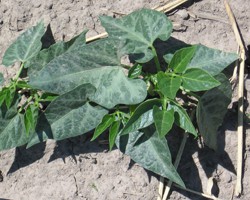2015 Lima Bean Herbicide Chart
Julie Kikkert, Team Leader, Extension Vegetable Specialist
Cornell Vegetable Program

Serious injury can be caused to lima beans if Eptam, Reflex, Assure II/Targa, or PostEmergence applications of Pursuit are used.
Herbicides that are labeled for lima beans in New York are given in the table below. Mark VanGessel from the University of Delaware provides the following information: on our loamy soils (approx. 1% organic matter) growers use 1.0 to 1.25 pints/A of Dual Magnum (rates similar for snap beans) and 1.5 to 2.0 oz of Pursuit at planting. They can be used pre-plant incorporated (PPI), but most farmers are applying them immediately after planting (PRE). Sandea is also labeled, but Pursuit is a better fit for the weeds in DE. Basagran, Sandea, Poast and Select Max are labeled for post-emergence control, with the choice depending on the weeds that emerge. We have a lot of Pursuit/Sandea resistant pigweeds in DE so be sure to rotate away from this mode of herbicide action in years that you are not growing lima beans in these fields.
Herbicides for Lima Bean Weed Control in NY in 2015 (pdf; 112KB)

Upcoming Events
2026 Northeast Extension Fruit Consortium Winter Webinar Series
February 4, 2026 : Management of Up and Coming Strawberry Diseases in the Northeastern United States
Session 1: Management of Up and Coming Strawberry Diseases in the Northeastern United States
February 11, 2026 : Kiwiberry Production in the Northeast
Session 2: Kiwiberry Production in the Northeast
February 18, 2026 : Heat Mitigation- Sunburn and Fruit Coloring
Session 3: Heat Mitigation- Sunburn and Fruit Coloring
February 25, 2026 : The Dating Game- Updates in Lepidopteran Mating Disruption
Session 4: The Dating Game- Updates in Lepidopteran Mating Disruption
March 4, 2026 : USEPA Endangered Species Act Strategies and Pesticide Use
Session 5: USEPA Endangered Species Act Strategies and Pesticide Use
March 11, 2026 : Practical Drought Management for Fruit Growers
Session 6: Practical Drought Management for Fruit Growers
Managing the Invasive Swede Midge Webinar
March 6, 2026 : Managing the Invasive Swede Midge Webinar
Swede midge is an invasive fly that causes serious economic losses to brassica crops. Due to its small size and hidden feeding habits, swede midge is often called an "invisible pest" and damage may be misdiagnosed. In this webinar, we will review the swede midge life cycle and crop damage symptoms, current management recommendations, new research findings, and highlights from on-farm case studies with a focus on organic management.
New Farm Manager Skills Day - Get the Tools You Need to Grow Your People (Hudson Valley)
March 10, 2026 : New Farm Manager Skills Day - Get the Tools You Need to Grow Your People
Millbrook, NY
Are you moving into a supervisory farm management role this season and want to get off to a good start? Are you an experienced manager who wants to connect with other "people" managers and work on your skills? This one-day workshop is for you!












































